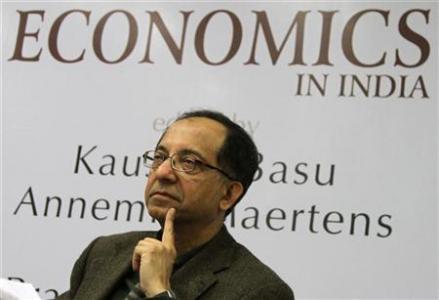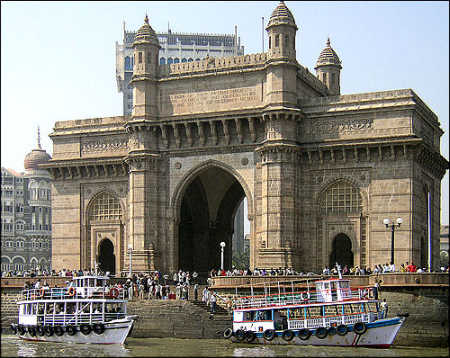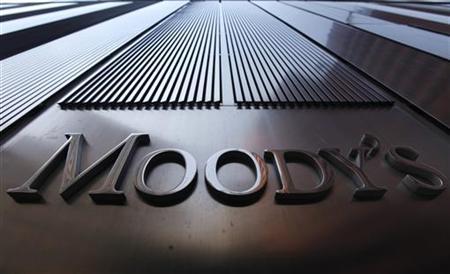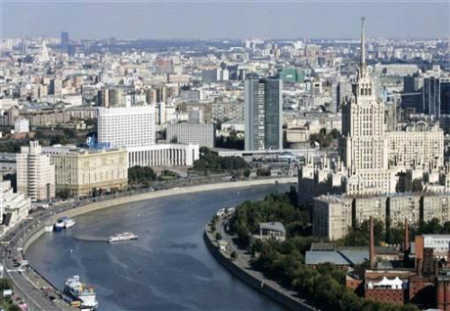Photographs: Reuters BS Reporter in New Delhi
The finance ministry has developed a new sovereign comparative rating method, which would be a part of this year's Economic Survey.
The index, called the "Comparative Rating Index for Sovereigns", is based on Moody's ratings and data on the gross domestic product of different nations as given by the International Monetary Fund, said Chief Economic Adviser Kaushik Basu.
The index has been developed keeping in mind the fact that when an investor searches across nations for a place to put money, the relative rating of nations is important.
Now, India to rank other nations
Image: The ministry has ranked 101 economies.Photographs: Reuters
Major credit rating agencies give out sovereign credit rating of each nation as an absolute grade. How other nations fare does not matter in a particular nation's rating score.
This is a new system for comparing the relative ratings of sovereign debt based on the historical evolution of their ratings over five years and the volume of their economic activity as measured by their GDP (not adjusted for purchasing power parity).
The ministry has ranked 101 economies according to this for the years 2007 to 2011.
"The index uses external data on GDP and ratings combined in terms of pure mathematical and statistical methods without interventions or interpretations," said Basu.
Now, India to rank other nations
Image: Index is based on Moody's ratings.Photographs: Reuters
The Moody's ratings, the ministry has used, are the long-term foreign currency sovereign ratings.
"The Moody's rating, by this measure, for India in 2007 and 2011 was the same (Baa 3). The CRIS score for these years for India were 66.47 (2007) and 69.83 (2011)," said a ministry release.
This means, in relative terms, India has become a better investment destination by 5.06 per cent. In addition, India's rank in terms of CRIS has moved up from 61 to 55.
"If we view the rankings in terms of quintiles (blocks of one-fifth of the distribution) India moves from the fourth quintile to the third, that is, the middle quintile," said Basu.
Now, India to rank other nations
Image: Score for Greece has dropped sharply. A view of Athens.Photographs: Reuters
As expected, the CRIS score for Greece has dropped sharply from 74.24 in 2007 to 13.97 in 2011, a decline of 81 per cent, and that of Ireland and Portugal dropped by more than 14 per cent.
In terms of CRIS, the US has seen its score rise from 78.20 to 81.81. This is accompanied by a loss of rank from the top of the chart to the 16th position. This shows that CRIS is distinct from a percentile score which is also a relative measure of status.
"The improvement in CRIS scores of nations such as India, China and Indonesia are partly due to the dramatic falls of scores of some European nations leading to a deterioration of the world average by over 4.8 per cent," Basu said.
Now, India to rank other nations
Image: Russia's index value rose by 7.5 per cent. A view of Moscow.Photographs: Reuters
China's index value has increased by 7.3 per cent across the 2007 to 2011 time span. Brazil's index value increased by 11.8 per cent, Russia's by 7.5 per cent and South Africa's by 5.79 per cent in the same period.
All the BRIC (Brazil, Russia India and China) nations had improved in rank as well as index value.
The 10 highest increases in the CRIS from 2007 to 2011 were achieved by Paraguay (31.26 per cent), Lebanon (22.71 per cent), Bolivia (21.2 per cent), Uruguay (18.09 per cent), Belize and Nicaragua (both 15.63 per cent), Philippines (14.26 per cent), Indonesia (12.83 per cent), Peru (12.75 per cent) and Ecuador (12.27 per cent).







article